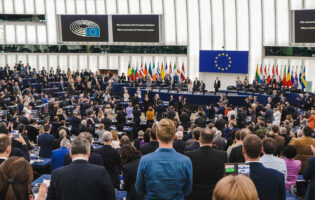Brexit Clouds TTIP Negotiations But May Not Scupper Deal

Marianne Schneider-Petsinger
Chatham House
Marianne Schneider-Petsinger is a Geoeconomics Non-Resident Fellow at AICGS. She is geoeconomics fellow in the US and Americas Programme at Chatham House, responsible for analysis at the nexus of political and economic issues. Before joining Chatham House, she managed the Transatlantic Consumer Dialogue – an international membership body representing consumer organizations in the EU and US. She also worked on transatlantic economic issues at the American Institute for Contemporary German Studies (AICGS) in Washington, DC and at the Ministry of Economic Affairs in the German state of Thuringia. Her research interest lies in the area of trade and transatlantic economic cooperation. Marianne completed her graduate studies focusing on international trade and finance at the Fletcher School of Law and Diplomacy (Tufts University) and the John F Kennedy School (Harvard University). She holds a BA in International Affairs and Economics from the University of Maine. Marianne is originally from Germany and spent almost ten years in the US. She is now based in London.
She is a 2016-2017 participant in AICGS’ project “A German-American Dialogue of the Next Generation: Global Responsibility, Joint Engagement,” sponsored by the Transatlantik-Programm der Bundesrepublik Deutschland aus Mitteln des European Recovery Program (ERP) des Bundesministeriums für Wirtschaft und Energie (BMWi).
With Britain’s decision to leave the EU, the clouds of uncertainty hanging over the proposed US-EU free trade deal (known as the Transatlantic Trade and Investment Partnership or TTIP) have become darker. The negotiations were formally launched three years ago and have stalled because of transatlantic differences (for instance over issues of investor protections and public procurement) as well as growing public opposition. For now, both the US and the EU negotiators are determined to weather the storm and continue talks when they meet in Brussels from 11-15 July.
The result of the UK’s EU referendum will blow a strong wind into the face of TTIP negotiators on three fronts. First, the Brexit vote will delay the TTIP talks as EU officials will focus their attention and political capital on the future UK-EU relationship. Once the UK government triggers Article 50 of the Lisbon Treaty, both sides have two years to sort out the separation proceedings. Only after it has become clear what Britain’s relationship with the EU will look like will the European side stop navel-gazing. The TTIP negotiations will likely continue in the meantime, but will be put on the back-burner.
This article originally appeared on the web site of Chatham House on July 11, 2016. Continue reading here.









